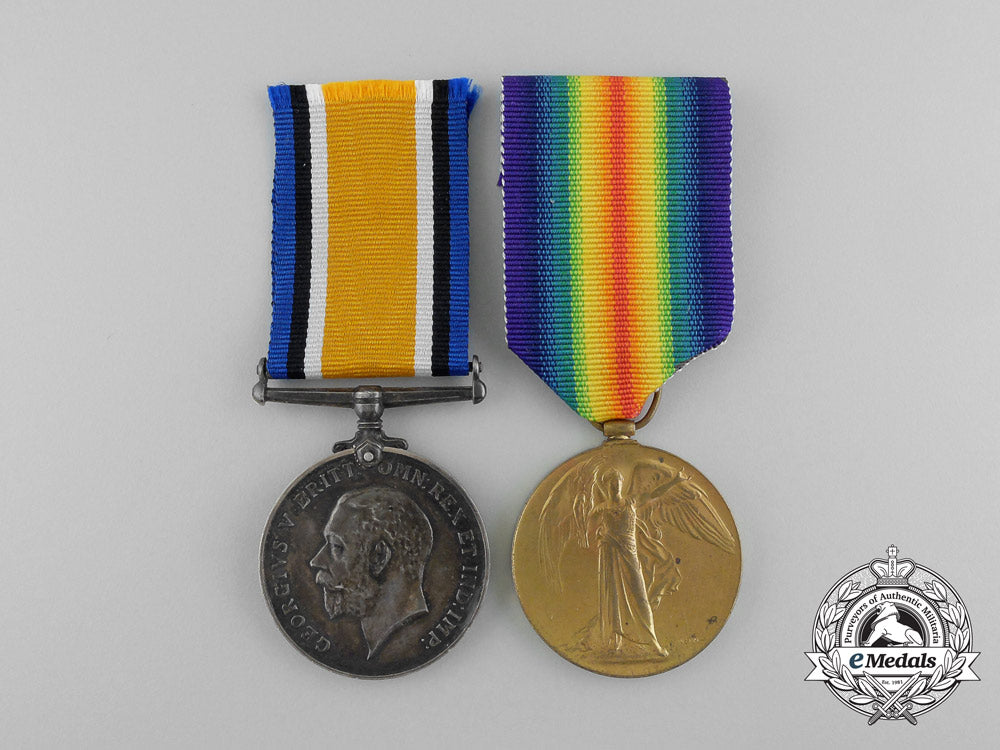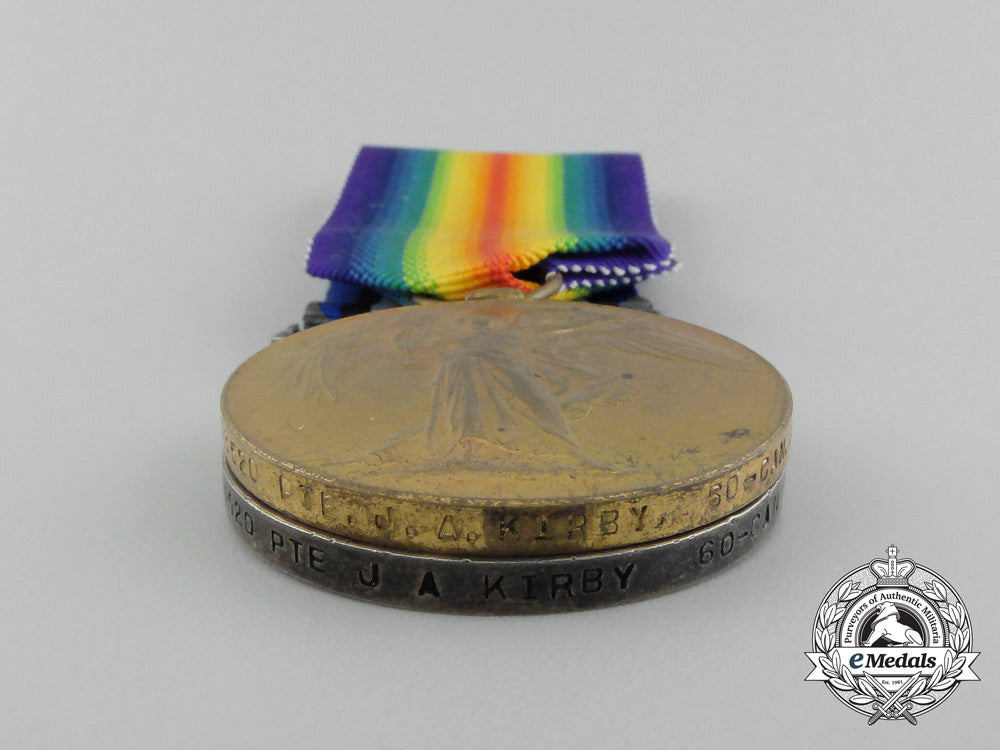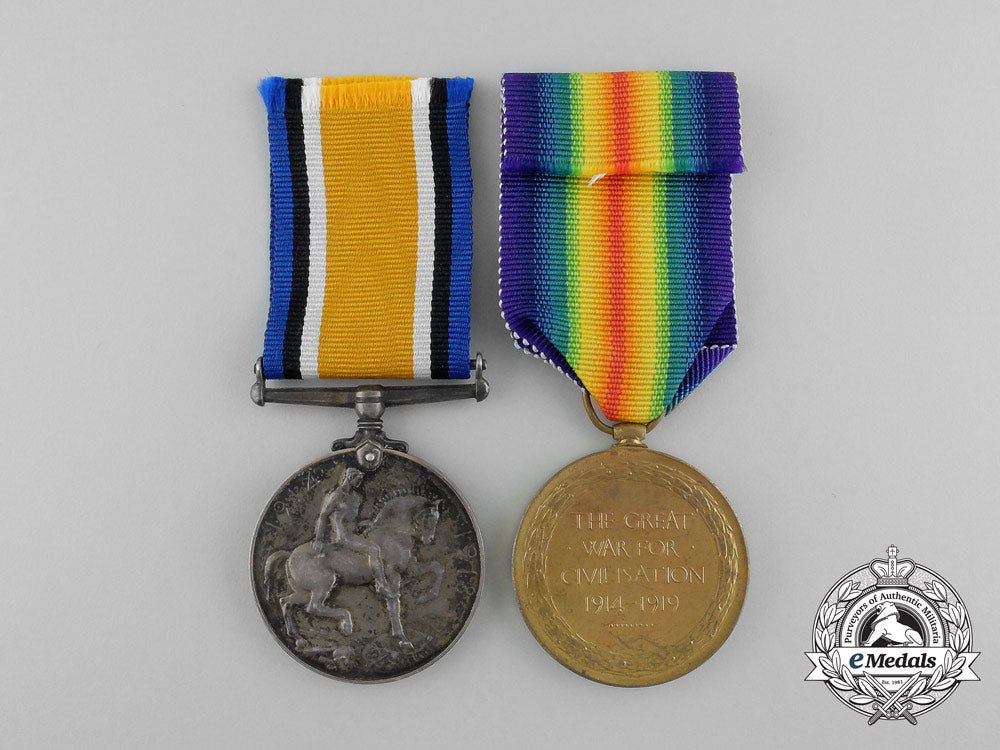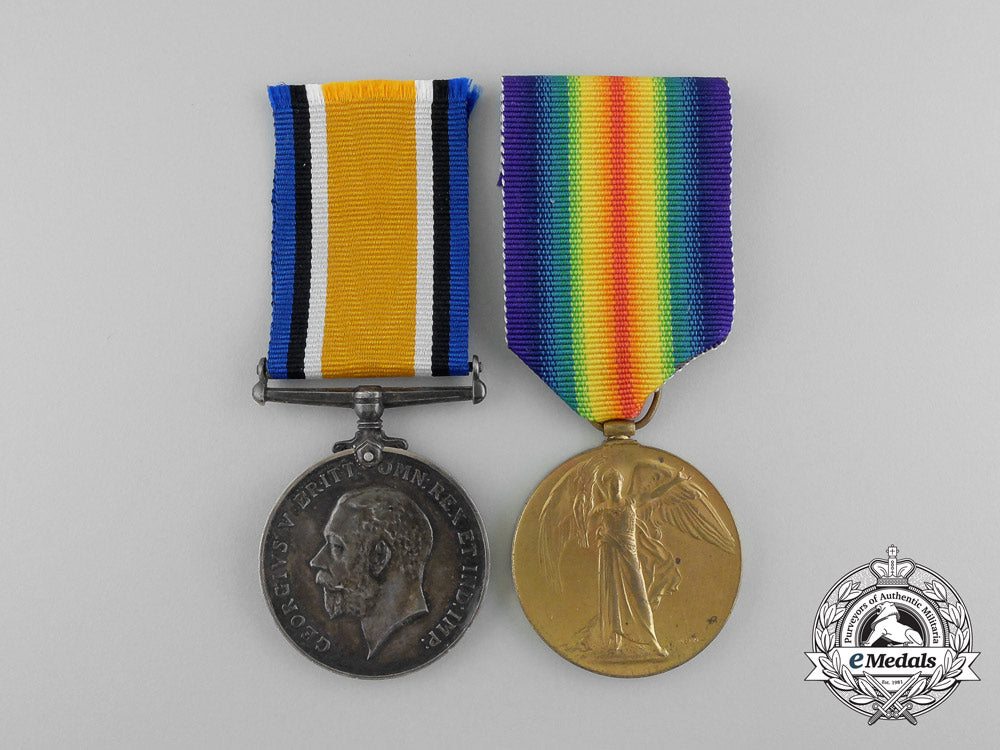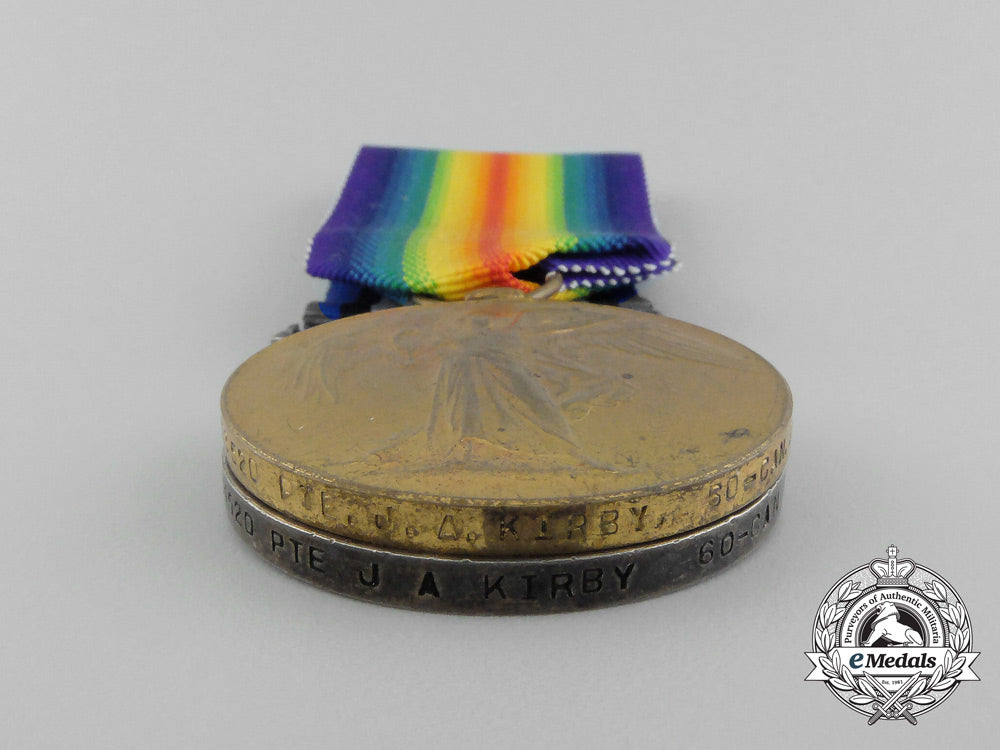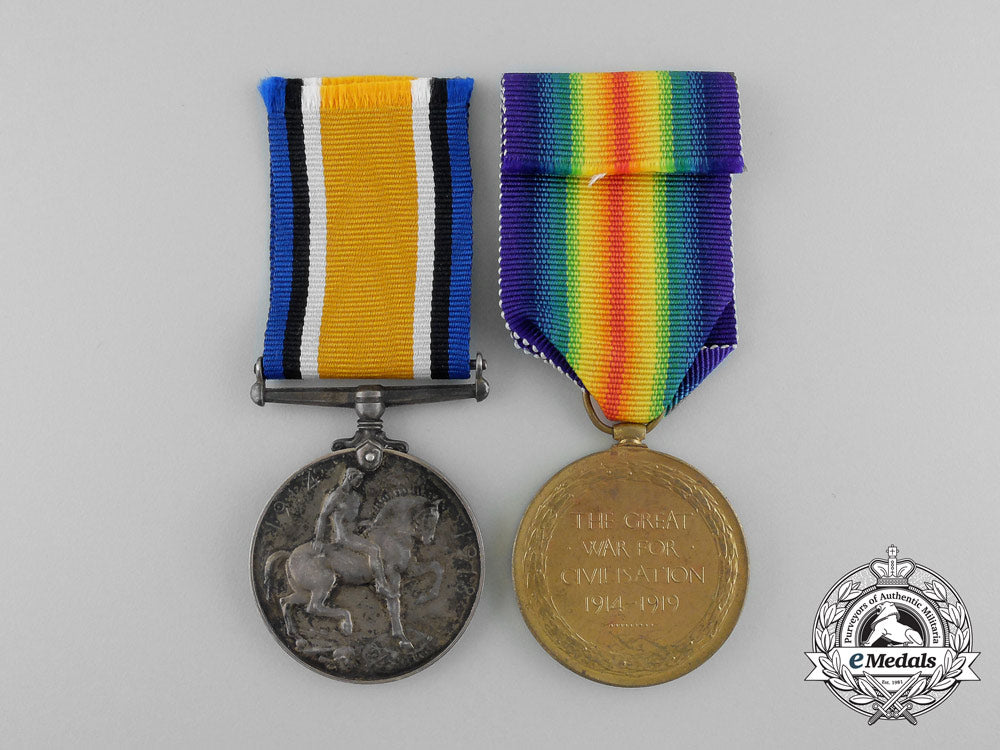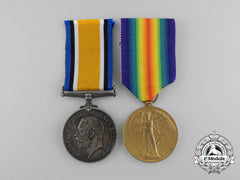
LOADING ...
In response to evolving domestic opinion, eMedals Inc has made the conscious decision to remove the presentation of German Third Reich historical artifacts from our online catalogue. For three decades, eMedals Inc has made an effort to preserve history in all its forms. As historians and researchers, we have managed sensitive articles and materials with the greatest of care and respect for their past and present social context. We acknowledge the growing sentiments put forth by the Canadian public and have taken proactive actions to address this opinion.
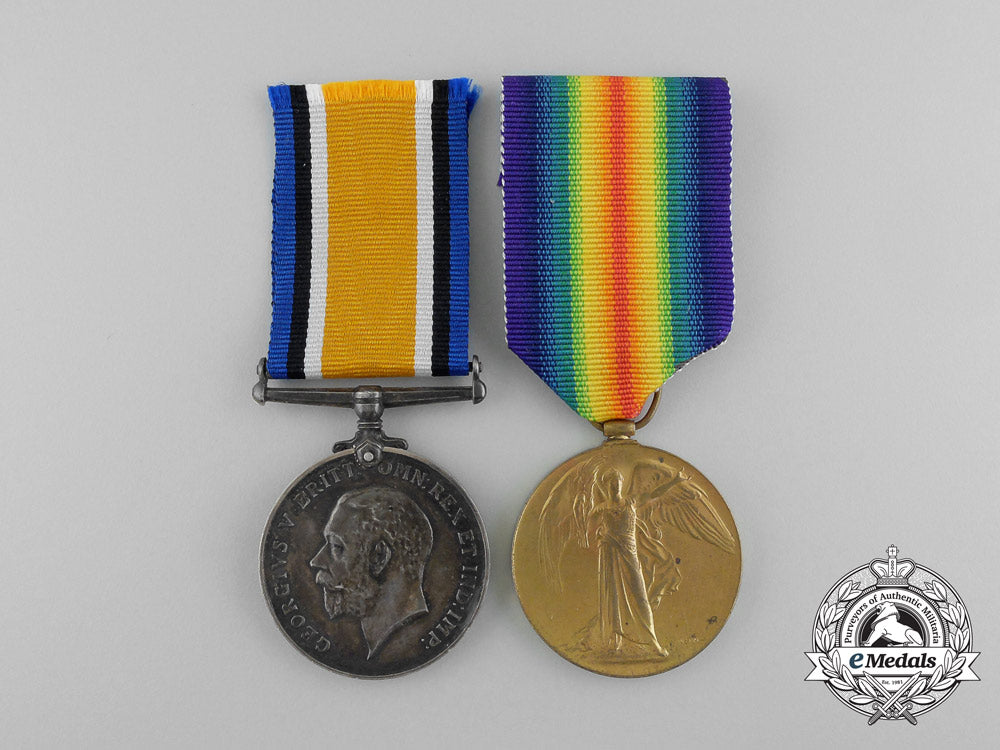
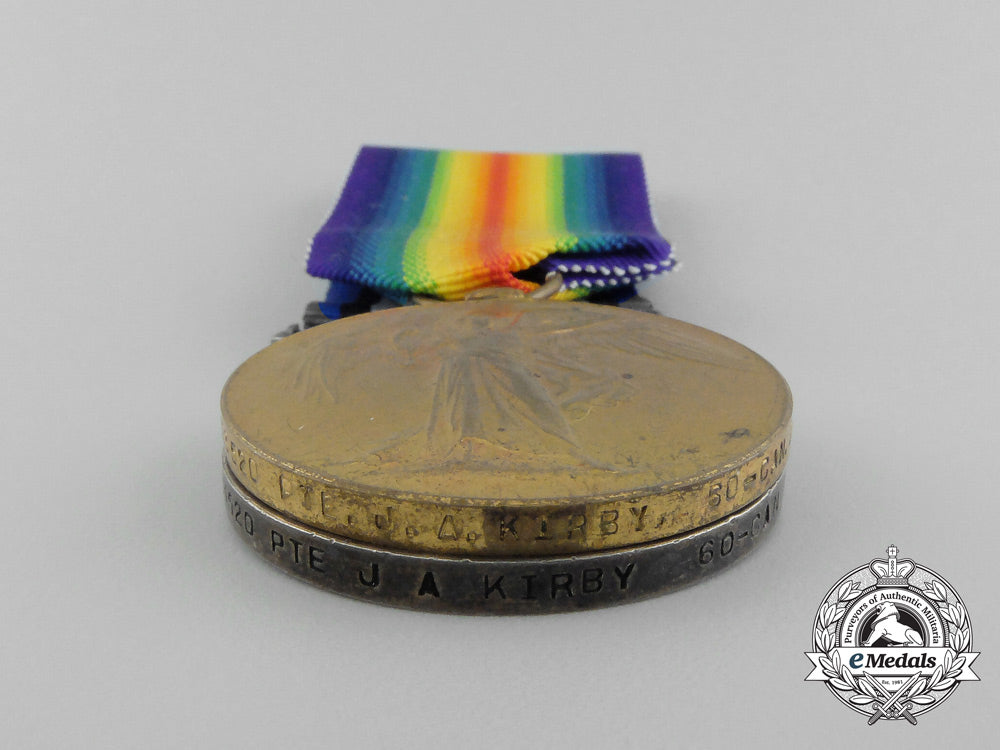
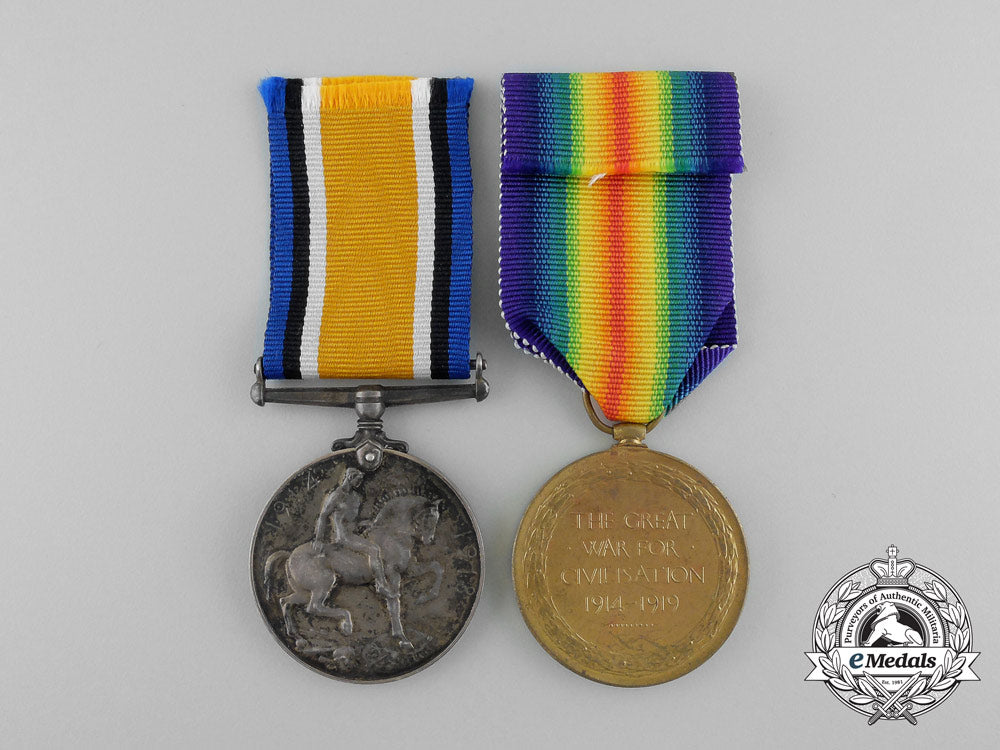
A First War Pair To The 60Th Canadian Infantry
A First War Pair To The 60Th Canadian Infantry
SKU: ITEM: C4524
Current Bid:
Your Max Bid:
Bid History:
Time Remaining:
Couldn't load pickup availability
Shipping Details
Shipping Details
eMedals offers rapid domestic and international shipping. Orders received prior to 12:00pm (EST) will be shipped on the same business day.* Orders placed on Canadian Federal holidays will be dispatched the subsequent business day. Courier tracking numbers are provided for all shipments. All items purchased from eMedals can be returned for a full monetary refund or merchandise credit, providing the criteria presented in our Terms & Conditions are met. *Please note that the addition of a COA may impact dispatch time.
Shipping Details
eMedals offers rapid domestic and international shipping. Orders received prior to 12:00pm (EST) will be shipped on the same business day.* Orders placed on Canadian Federal holidays will be dispatched the subsequent business day. Courier tracking numbers are provided for all shipments. All items purchased from eMedals can be returned for a full monetary refund or merchandise credit, providing the criteria presented in our Terms & Conditions are met. *Please note that the addition of a COA may impact dispatch time.
Description
Description
British War Medal (163520 PTE. J.A. KIRBY. 60-CAN.INF.); and Victory Medal (163520 PTE. J.A. KIRBY. 60-CAN.INF.). Naming is officially impressed. Un-mounted, replacement ribbons, dark patina on the BWM, light contact on the VM, near extremely fine.
Footnote: John Albert Kirby was born in London, England on April 29, 1873. He signed his Attestation Paper as a Private (163520) with the 84th Infantry Battalion, on August 4, 1915 in Toronto, Ontario, at the age of 42 years, 3 months, naming his next-of-kin as his son, also named John Albert Kirby, stating that he was with an Active Militia (not identified), that he was a Widower and that his trade was that of Labourer (Plasterer). In his records, it indicates that his wife had passed away on July 29, 1915 and that his son was already overseas as a Private (58290) with the 20th Infantry Battalion. His son, John Albert Kirby, was born on October 24, 1893 in London, England and signed his Attestation Paper as a Private (58290) with the 20th Infantry Battalion, on April 12, 1915 in Toronto, Ontario, at the age of 21 years, 5 months, naming his next-of-kin as his mother, Mrs. J.A. Kirby of Toronto, stating that he was with an Active Militia (nine months with the 9th Mississauga Horse), that he was not married and that his trade was that of Mill Hand. The young Kirby arrived in England on May 24, 1915 and suffered a gun shot wound to the face, specifically to the left side of his neck, just below the ear, on October 10, 1915. After a series of hospitalizations, he left Liverpool for Canada on July 10, 1917 and was discharged from service on March 9, 1918. His father, the senior John Albert Kirby, 84th Infantry Battalion, embarked Montreal, Quebec on September 25, 1915, arriving in Plymouth, England on October 4th, was appointed Acting Corporal on the 5th and taken on strength of the 36th Reserve Battalion at West Sandling on the 6th. Five months later, Kirby "paraded sick at West Sandling" on March 5, 1916 and was subsequently admitted to Moore Barracks, Canadian Hospital, Shorncliffe with "Traumatic Orchitis" (an inflammation of the testicles, that can be caused by either bacteria or a virus) the following day, experiencing pain and swelling in the left testicle. After a week and now recovered, he was transferred to the Canadian Convalescent Hospital in Monks Horton, Kent on March 11th and would remain there for the next five weeks, before being posted to the 36th Infantry Battalion at West Sandling, on April 15, 1916. Seven and half weeks later, Kirby was transferred to the 60th Infantry Battalion on June 6, 1916, arriving at the Canadian Base Depot in France on the 7th, where he reverted to the rank of Private at his own request. He left the Canadian Base Depot for his new unit on the 8th and joined them on the 9th. Three months after arriving in the French theatre, Private Kirby arrived at the Canadian Base Depot "Unfit" on September 9, 1916. It was also determined that he was overage and was invalided to England on September 16th, where he was transferred to the Canadian Casualty Assembly Centre at Folkestone, designated Class "C". In his Proceedings of a Medical Board, dated September 18, 1916 at Folkestone, the officially diagnosis of "Myalgia" (muscle pain, a symptom of many diseases and disorders) was established, along with the fact he was overage, the doctor noting "He looks his age but says he can do clerical work". Two days later, Kirby was placed on command to the 23rd Infantry Battalion, on September 20, 1916 and attached from the Canadian Casualty Assembly Centre for Personal Base Duty. He was re-examined at Dibgate Camp at Shorncliffe. In his Medical Report of an Invalid, dated October 20, 1916, not only was it established that he was actually 48 years old, making his birth year actually 1868, and that his Myalgia was aggravated by living in camp and doing training, but that he had had Lumbago (a general term referring to lower back pain) periodically for ten years. Five and a half weeks later, he ceased to be attached to the Canadian Casualty Assembly Centre and the 23rd Infantry Battalion, on November 28, 1916 and was placed on command at the Canadian Discharge Depot for Personal Base Duty on November 30th. In his Medical Report of an Invalid, dated December 9, 1916 at Hastings, Sussex, the doctor stated that the "Patient states that previous to enlistment he was subject to spells of Rhumatism, especially in (the) back. Would have to leave work for 2 or 3 days at a time. Recurs at times leaving him very sore over lumbar region and in (the) legs, walks with (the) aid of a cane, cannot stand the damp cold weather here, was better in Canada, states he was 48 years of age on April the 29th 1916. Enlisted as 42." He went on to say that the "Patient looks about (the) age stated, fairly well nourished. Muscular condition fair, stated weight 139 lbs., height 5 ft. 4 in. Intelligence fair. On examination find some tenderness on pressure of the lumbar muscles. Cannot stoop unless painful, no history of kidney trouble, more painful at night than day." and that it was an "old condition aggravated by service". In his Proceedings of a Medical Board, dated January 12, 1917 at Hastings, it was determined that he would have permanent disability while in the military and that he would have "less than 1 in 4 chance of earning a full livelihood in the general labour market", so he was recommended for discharge from service on January 12, 1917. Four days later, he was posted to the Canadian Discharge Depot on January 16, 1917, for return to Canada. Stricken with Myalgia and determined to be overage, he was struck off strength, sailing for Canada aboard the S.S. Missanabie on February 2, 1917. Private John Albert Kirby was discharged as "being no longer physically fit for war service" and struck off strength as "Medically Unfit" at the Discharge Depot at Quebec City, Quebec on March 9, 1917. For his First World War service, he was awarded the British War Medal and the Victory Medal. He died on March 26, 1929, at the age of 55.
Description
British War Medal (163520 PTE. J.A. KIRBY. 60-CAN.INF.); and Victory Medal (163520 PTE. J.A. KIRBY. 60-CAN.INF.). Naming is officially impressed. Un-mounted, replacement ribbons, dark patina on the BWM, light contact on the VM, near extremely fine.
Footnote: John Albert Kirby was born in London, England on April 29, 1873. He signed his Attestation Paper as a Private (163520) with the 84th Infantry Battalion, on August 4, 1915 in Toronto, Ontario, at the age of 42 years, 3 months, naming his next-of-kin as his son, also named John Albert Kirby, stating that he was with an Active Militia (not identified), that he was a Widower and that his trade was that of Labourer (Plasterer). In his records, it indicates that his wife had passed away on July 29, 1915 and that his son was already overseas as a Private (58290) with the 20th Infantry Battalion. His son, John Albert Kirby, was born on October 24, 1893 in London, England and signed his Attestation Paper as a Private (58290) with the 20th Infantry Battalion, on April 12, 1915 in Toronto, Ontario, at the age of 21 years, 5 months, naming his next-of-kin as his mother, Mrs. J.A. Kirby of Toronto, stating that he was with an Active Militia (nine months with the 9th Mississauga Horse), that he was not married and that his trade was that of Mill Hand. The young Kirby arrived in England on May 24, 1915 and suffered a gun shot wound to the face, specifically to the left side of his neck, just below the ear, on October 10, 1915. After a series of hospitalizations, he left Liverpool for Canada on July 10, 1917 and was discharged from service on March 9, 1918. His father, the senior John Albert Kirby, 84th Infantry Battalion, embarked Montreal, Quebec on September 25, 1915, arriving in Plymouth, England on October 4th, was appointed Acting Corporal on the 5th and taken on strength of the 36th Reserve Battalion at West Sandling on the 6th. Five months later, Kirby "paraded sick at West Sandling" on March 5, 1916 and was subsequently admitted to Moore Barracks, Canadian Hospital, Shorncliffe with "Traumatic Orchitis" (an inflammation of the testicles, that can be caused by either bacteria or a virus) the following day, experiencing pain and swelling in the left testicle. After a week and now recovered, he was transferred to the Canadian Convalescent Hospital in Monks Horton, Kent on March 11th and would remain there for the next five weeks, before being posted to the 36th Infantry Battalion at West Sandling, on April 15, 1916. Seven and half weeks later, Kirby was transferred to the 60th Infantry Battalion on June 6, 1916, arriving at the Canadian Base Depot in France on the 7th, where he reverted to the rank of Private at his own request. He left the Canadian Base Depot for his new unit on the 8th and joined them on the 9th. Three months after arriving in the French theatre, Private Kirby arrived at the Canadian Base Depot "Unfit" on September 9, 1916. It was also determined that he was overage and was invalided to England on September 16th, where he was transferred to the Canadian Casualty Assembly Centre at Folkestone, designated Class "C". In his Proceedings of a Medical Board, dated September 18, 1916 at Folkestone, the officially diagnosis of "Myalgia" (muscle pain, a symptom of many diseases and disorders) was established, along with the fact he was overage, the doctor noting "He looks his age but says he can do clerical work". Two days later, Kirby was placed on command to the 23rd Infantry Battalion, on September 20, 1916 and attached from the Canadian Casualty Assembly Centre for Personal Base Duty. He was re-examined at Dibgate Camp at Shorncliffe. In his Medical Report of an Invalid, dated October 20, 1916, not only was it established that he was actually 48 years old, making his birth year actually 1868, and that his Myalgia was aggravated by living in camp and doing training, but that he had had Lumbago (a general term referring to lower back pain) periodically for ten years. Five and a half weeks later, he ceased to be attached to the Canadian Casualty Assembly Centre and the 23rd Infantry Battalion, on November 28, 1916 and was placed on command at the Canadian Discharge Depot for Personal Base Duty on November 30th. In his Medical Report of an Invalid, dated December 9, 1916 at Hastings, Sussex, the doctor stated that the "Patient states that previous to enlistment he was subject to spells of Rhumatism, especially in (the) back. Would have to leave work for 2 or 3 days at a time. Recurs at times leaving him very sore over lumbar region and in (the) legs, walks with (the) aid of a cane, cannot stand the damp cold weather here, was better in Canada, states he was 48 years of age on April the 29th 1916. Enlisted as 42." He went on to say that the "Patient looks about (the) age stated, fairly well nourished. Muscular condition fair, stated weight 139 lbs., height 5 ft. 4 in. Intelligence fair. On examination find some tenderness on pressure of the lumbar muscles. Cannot stoop unless painful, no history of kidney trouble, more painful at night than day." and that it was an "old condition aggravated by service". In his Proceedings of a Medical Board, dated January 12, 1917 at Hastings, it was determined that he would have permanent disability while in the military and that he would have "less than 1 in 4 chance of earning a full livelihood in the general labour market", so he was recommended for discharge from service on January 12, 1917. Four days later, he was posted to the Canadian Discharge Depot on January 16, 1917, for return to Canada. Stricken with Myalgia and determined to be overage, he was struck off strength, sailing for Canada aboard the S.S. Missanabie on February 2, 1917. Private John Albert Kirby was discharged as "being no longer physically fit for war service" and struck off strength as "Medically Unfit" at the Discharge Depot at Quebec City, Quebec on March 9, 1917. For his First World War service, he was awarded the British War Medal and the Victory Medal. He died on March 26, 1929, at the age of 55.
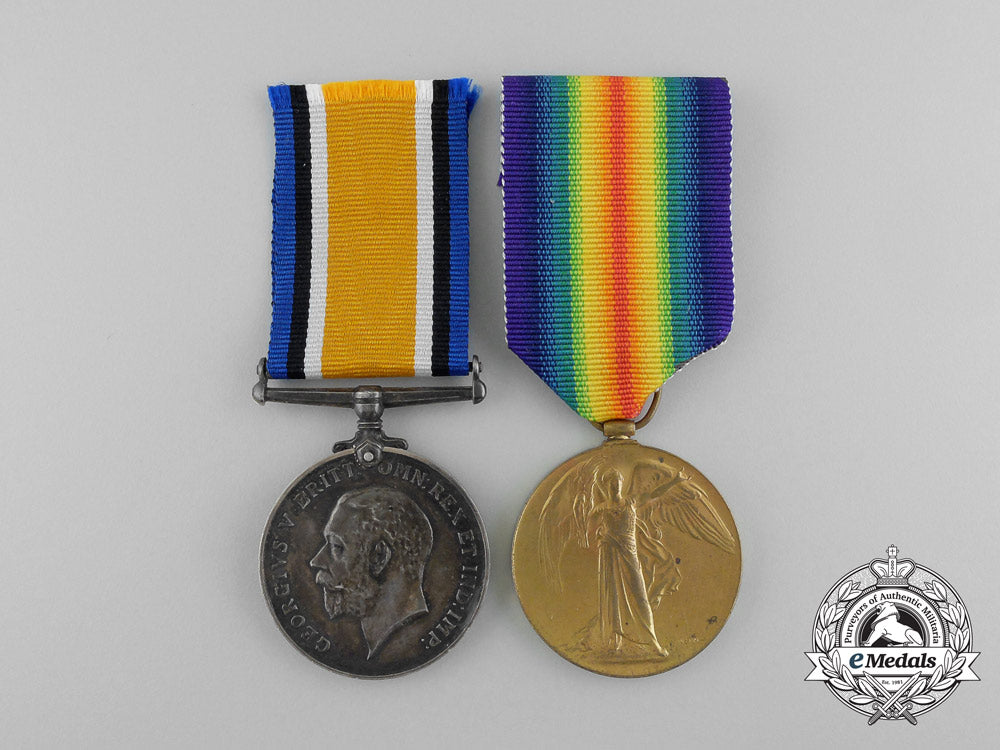
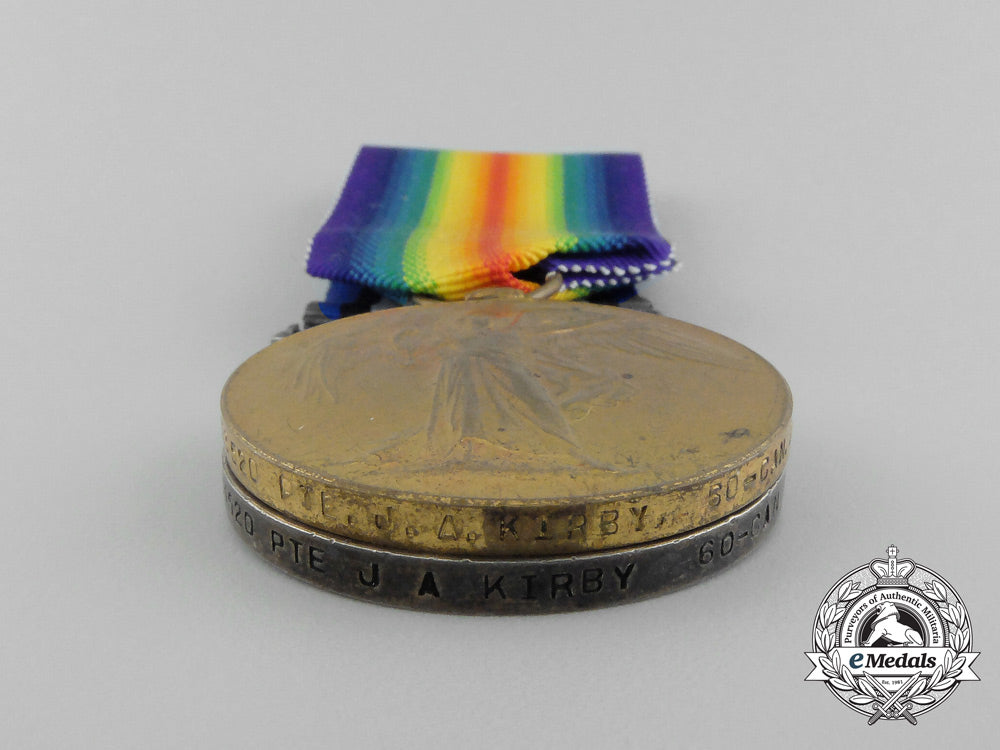
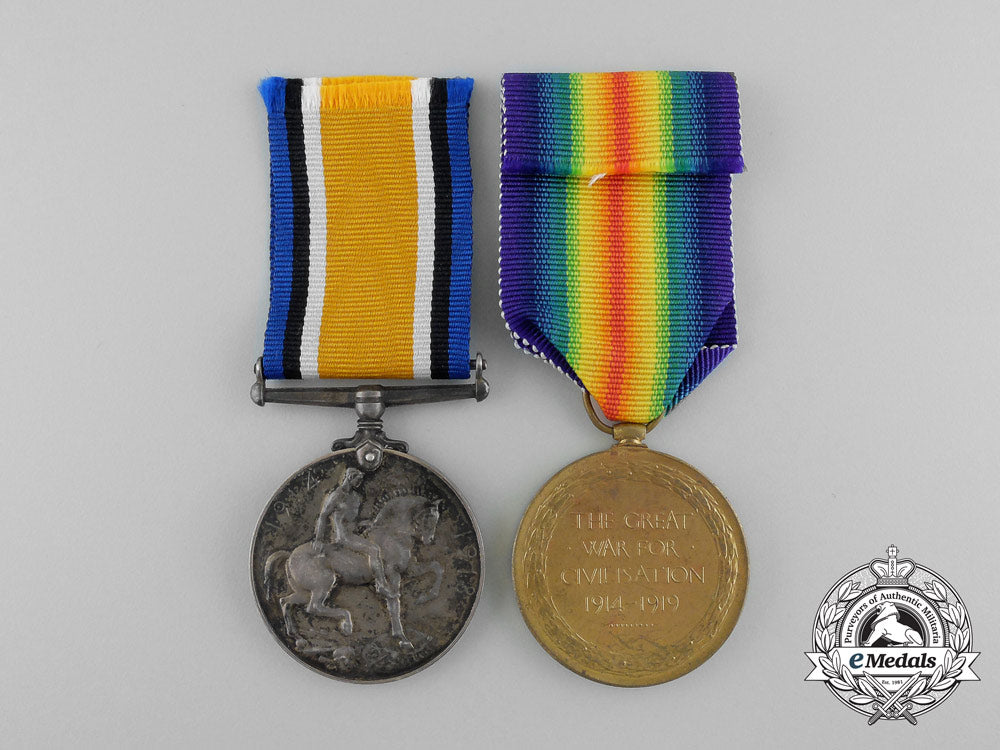
You May Also Like
United Kingdom. An Order of the British Empire, Commander
GB8222
Thailand, Kingdom. An Order of the Crown, Grand Cross, c.1945
W6710
Germany, Feueschutzpolizei. An Em/Nco’s Visor Cap
G48848
Brazil, Kingdom. An Order of Military Merit, Commander
W8368
United States. A Second War Airborne Army Ring
W8367
-
United Kingdom. An Order of the British Empire, Commander
GB8222
Add to CartRegular price $675 USDRegular price $0 USD Sale price $675 USDUnit price / per -
Thailand, Kingdom. An Order of the Crown, Grand Cross, c.1945
W6710
Add to CartRegular price $3,000 USDRegular price $0 USD Sale price $3,000 USDUnit price / per -
Germany, Feueschutzpolizei. An Em/Nco’s Visor Cap
G48848
Add to CartRegular price $340 USDRegular price $0 USD Sale price $340 USDUnit price / per -
Brazil, Kingdom. An Order of Military Merit, Commander
W8368
Add to CartRegular price $320 USDRegular price $0 USD Sale price $320 USDUnit price / per -
United States. A Second War Airborne Army Ring
W8367
Add to CartRegular price $200 USDRegular price $0 USD Sale price $200 USDUnit price / per
Do you have a similar item you are interested in selling?
Please complete the form and our client care representatives will contact you.
Sell Item